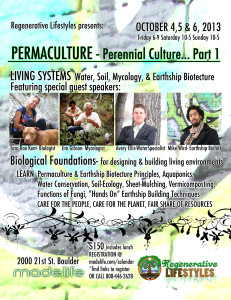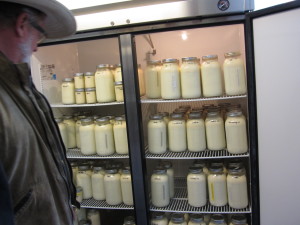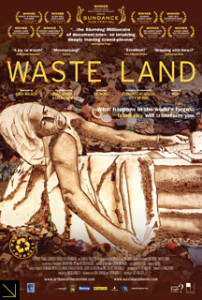Presented by Regenerative Lifestyles:
Permaculture-Perennial Culture, Part 1
Living Systems: Soil, Water, Mycology, & Earthship Biotecture, OCTOBER 4, 5, & 6, 2013
Friday, October, 4, 2013, 6pm-9pm
Introduction to Permaculture
Mycology with Jim Gibson
Saturday, October 5, 2013, 10am-5pm
Soil Ecology with Tara Rae Kent
Water Flows with Avery Ellis
Earthship Biotecture with Mike Wird
Sunday, October 6, 2013, 10am-5pm
Design for the Future- Regenerative Design
Hands on- Earthship Building Techniques
$150 find links to register at madelife.com/calendar/
Lunch will be provided on Saturday and Sunday. Please bring snacks to share.
About this event:
Biological Foundations for Designing and Building Living Environments
With infinite possibilities, one could wonder why we are in the predicament of Ecological disaster. The planet holds the solutions, and with inspiring and useful experience; with interesting educational opportunities, we can all learn to work together and be the catalyst for change.
Soil– As Colorado residents, we live in a desert, a place where we can design and create environments which can heal depleted soils, aid in water retention, and balance soil structure. Tara Rae Kent will be speaking on soil building; utilizing vermicomposting, and sheet mulching. When designed with the natural patterns in mind, plants grows bigger, better and healthier, thus creating abundance.
Water – Water flows, usually straight to the gutter or into the foundation of the building. The information about greywater and aquaponics that Avery Ellis will present can help participants learn how to conserve water, practice re-use, grow happy plants, and lower water bills. The design systems provide tools that can help you, your family and the community.
Mycology– The study of Fungi, a strange and creative world that lives almost everywhere. Fungi are evolutionarily more closely related to animals than to plants, and their uses are both complex and surprising. Jim Gibson will define Mycology and his work, possibly inspiring an interest into a way of life.
Earthship Biotecture– Some people think that there’s a village of Aliens living just outside Taos, New Mexico, in super strange and beautiful Earthships. But if you look into it, you’ll be excited to find, they’re radically sustainable, off-grid structures that follow 6 design principles. Mike Wird will be lecturing about his experience of Earthship Culture, the principles of Biotecture. On Sunday, we will work together to start an Earthship Chicken Coop @ In the Grove-Urban Permaculture Design Site, located in downtown Boulder on 1/3 acre. There, participants will experience tire pounding, building can walls, and constructing bottle bricks.
Guest speakers:
Avery Ellis- Water Flow Specialist- Owner
Avery has a Masters degree in Ecological Design through SFIA, a BS in Biology & Sustainability, and Advanced Permaculture Designer and PC Teacher certificates, and is a certified greywater installer. Avery is a leader in the movement to make greywater and water catchment an attainable resource, and is currently writing Colorado water code.
Design, & Installation for Water Reuse & Ecological Sanitation.
integratedaquaponics.net
coloradogreywater.com
Tara Rae Kent- Biologist- Environmental Scientist for HDR www.hdrinc.com
Tara Rae Kent holds an Advanced Permaculture Design Certificate, and a Permaculture Teaching Certificate. She has managed several greenhouses, USDA-organic, organic, and permaculture farms with experience in 3 climate zones – cool and wet; cool and dry; and warm and wet. In the last decade, Ms. Kent has worked in scientific laboratories for universities, taught water quality monitoring classes, and authored a nature center field guidebook. She holds Bachelor’s and Master’s degrees in biology and freshwater ecology, and works as an environmental scientist/biologist in the consulting world.
Jim Gibson- Mycologist- President of Colorado Mycological Society
Jim Gibson, a Colorado native, is a Permaculture activist and Advanced Permaculture Designer, 2013 President of the Colorado Mycological Society, a member of the North American Mycological Association, Transition Colorado, a Life Member of Trout Unlimited and other organizations. Jim teaches/facilitates mushroom cultivation and mycolandscaping, Jim has presented at Bioneers Colorado in ’09, ’11 and 2012. He is a graduate of the Stamets schools for Mushroom Cultivation and for Mycorestoration. He has studied Food Forest Gardening with Eric Toensmeier in Colorado for the past three years. Jim’s goal is to further the appreciation and utilization of fungi in ecological restoration along with the production of food and medicine for the planet, for people, and for all life. cmsweb.org
Mike Wird- Earthship Biotect- Founder of Regenerative Lifestyles
Hiphop arts renaissance man, the artist’s artist. Mike is certified in Advanced Permaculture Design and Earthship Biotecture. He teaches Permaculture Design, Biotecture, and Hiphop. As an educator, organizer, entrepreneur, DJ, emcee/poet, natural holistic health and wellness advocate and sustainable living practitioner, he brings important issues to light. Currently, he’s teaching high school in Denver with YouthOnRecord. (O.G.) organic gardener and natural builder, Mike is Co-founder of Denver Earthship, dedicated to bringing Earthship Biotecture to the city.
earthshipbiotecture.com
www.regenerativelifestyles.org
FIND LINKS TO REGISTER @ madelife.com/calendar/ OR
CALL ROBIN AT 808-446-2628 FOR MORE INFORMATION
madelife, 2000 21st Street, Boulder, CO 80302 (Pearl St. & 21st St.)













